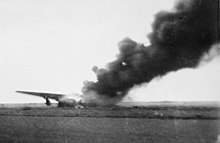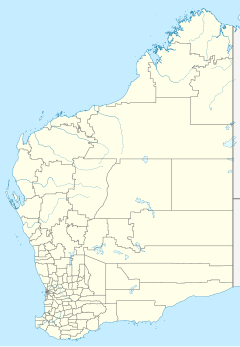Roebuck Bay Seaplane Base
18°07′S 122°16′E / 18.117°S 122.267°E





Roebuck Bay Seaplane Base, also called Broome Seaplane Base, was located in Roebuck Bay Western Australia near the town of Broome. The base opened in March 1942 and operated Consolidated PBY Catalina seaplanes during World War II. The base was used by the United States Navy starting in 1942.[1]
History
[edit]Roebuck Bay, also called Broome Harbor, is a natural bay offering a protected port on Australia's northwestern shore. Following the loss of Naval Base Manila in the Philippines, the US seaplanes fled to the Dutch East Indies and then to Balikpapan, Indonesia until these ports were taken over by the Empire of Japan in March 1942. By December 19, 1941 ten PBY Catalinas were in Balikpapan: VP-101 had P-2, P-3, P-6, P-8, P-9, P-11 and VP-102 had P-23, p-25, P-26 P-2. The seaplanes at Roebuck Bay came from Surabaya, Java after Japan's occupation of Java in 1942. Parts of Patrol Squadrons VP-22, VP-101 and VP-102 of the U.S. Navy's Pat Wing 10 were operating from Roebuck Bay Seaplane Base. By the time the PBYs of Pat Wing 10 arrived at Roebuck Bay Seaplane Base about half of the planes had been lost. The base was also used by the Royal Netherlands Navy after departing Java, Royal Air Force and the Royal Australian Air Force. After the raid on March 3, 1942, PBY operations moved south to Seaplane Base Exmouth. USS Childs, a destroyer converted into a seaplane tender, was serving the planes at Roebuck Bay, but departed before the raid. Childs did leave behind a launch boat, that saved the lives of many during the raid. The motor schooner Nickolbay was at Roebuck Bay acting as a seaplane tender at the time of the raid. Nickolbay was the only transportation to survive the attack, as such transported some from Roebuck Bay to Port Hedland, about 300 miles south. Broome was attacked three more times by Japanese aircraft, but with not much damage. Broome Harbor had been a pearling port since 1883. Roebuck Bay and the Broome Airfield was used for 14 days before the raid by the Dutch as a refueling stop for planes evacuating Dutch East Indies refugee and troops to Perth. In those 14 days over 8,000 Dutch had passed though Broome. The Royal Australian Air Force and US Navy assisted the Dutch in the evacuations.[2][3][4]
March 3, 1942 raid
[edit]On March 3, 1942 at 9:20 AM nine A6M2 Zeros and a C5M2 plane strafed the seaplanes at the base. The tide was low so most of the planes were far from shore awaiting to be refueled.[5] At the time only two US Navy PBY planes were at Roebuck Bay and no US crews were injured. In the raid 70 people killed and 24 aircraft were destroyed, 15 of the aircraft were flying boats at Roebuck Bay seaplane base. Some of these planes are still in the bay and can be seen about a mile offshore in low spring and king tides.[6][7]
The United States Armed Forces operating the base at Broome thought the base was out of range of Japanese fighters based in Timor. But the planes used had extra fuel tanks added to make the attack. The town of Derby, Western Australia north of Roebuck Bay was also strafed on March 3, 1942.[8]
Losses
[edit]Not one aircraft was operational at the end of the attack at 10.30 AM. The aircraft lost in the raid were:[9]
- Five Dornier Do 24 of the Netherlands Naval Aviation Service (MLD)
- Four PBY Catalina of MLD, PBY-5
- Two PBY Catalina of the US Navy, PBY-4 # 6 and #7
- Two PBY Catalina of the Royal Air Force, landed from Singapore, by Tjilatjap, Java, PBY-5
- Two Short Empire, S.23 flyingboats, Both owned by Imperial Airways of (BOAC), one operated by Qantas and one operated by Royal Australian Air Force.
- Details:
- Dornier Do 24K-1 Serial Number X-1 MLD was sunk.[10]
- Dornier Do 24K-1 Serial Number X-20 MLD set on fire and sunk. From Lengkong, Tangerang, Banten landed before the attack at 9:00 AM.[11]
- Dornier Do 24K-1 Serial Number X-23 MLD set on fire and sunk. From East Java, landed before the attack, crew and passengers were ashore, maintenance crew was checking plane.[12]
- Short Empire, S.23, Corinna Empire Flying Boat Registration G-AEUC, the first plane to be sunk in the attack, operated by Qantas Empire Airways (QEA).[13]
- Short Empire, S.23 Centaurus, Registration G-ADUT Serial Number A18-10, Short Empire, S.23 Centaurus a medium-range four-engined flying Qantas operated by Imperial Airways of London, the boat caught fire and sank, flight crew on board rescued.[14]
- Two Royal Air Force PBY Catalina sunk[15]
- Two Dutch Dornier Do 24 with the Dutch Royal Marine Airforce, with women and children were hit in the attack. About 35 to 40 Dutch civilians refugees were killed in the raid, they were on their way south to Naval Base Perth.[16]
- Dutch and British PBYs were sunk also in the raid.[17]
- B-24A Liberator Serial Number 40-2374 Number 74 was in the air, caught fire just after take-off when attacked and crashed into Roebuck Bay with some loss of life. One member Sgt. Melvin Donoho swam for 36 hours to shore, a distance of about 16 km (9.9 mi).[18][19]
- At Broome airfield, two US Boeing B-17 Flying Fortress, Consolidated B-24 Liberator, Lockheed Lodestar and two Lockheed Hudson bombers were attacked and destroyed. A Netherlands East Indies Airline's (KNILM) DC-3 transports was destroyed also. All seven allied aircraft at the airfield were destroyed. There were no injuries at the airfield, as all were able to find cover.[20]
March 20, 1942 raid
[edit]On March 20, 1942 Mitsubishi G4M2 "Betty" medium bombers bombed the Broome Airfield. Attack killed one civilian and did minor damage to the airfield.[21]
Memorials
[edit]Raid memorials at Broome:[22][23]
- There are four Broome air raid memorials in Broome:
- Broome Air Raid Memorial, town center[24]
- Allied War Memorial Wall in Bedford Memorial Park,[25] lists those known to have been lost
- Broome Air Raid 50th Anniversary Memorial at Town Beach[26] overlooking Roebuck Bay
- Memorial to the 76 Dutch civilians lost and who were initially buried there, at Town Beach
- Dornier Do24K Engine from Royal Netherlands Air Force plane is on display at the Broome Historical Society museum[27]
- Dornier Do24K Engines from Royal Netherlands Air Force plane is on display at the departure gate of Broome Airport[28]
See also
[edit]References
[edit]- ^ Roebuck Bay seaplane basepacificwrecks.com
- ^ "Fremantle was a big submarine base". Army News. Darwin, NT. 25 August 1945. p. 3. Retrieved 8 February 2016 – via National Library of Australia.
- ^ Patwing-10ozatwar.com
- ^ AUSTRALIA'S UNDERSEA AERIAL ARMADACharles Darwin University
- ^ Roebuck Bay Seaplane Base raidtracesofwar.com
- ^ Broome pacificwrecks.com
- ^ Broome raidspacificwrecks.com
- ^ Seventy three years and still more to find from Broome air raids,By Richard Dinnenabc.net
- ^ Roebuck Bay Seaplane Basemuseum.wa.gov.au
- ^ Dornier Do 24K-1 Serial Number X-1 pacificwrecks.com
- ^ Dornier Do 24K-1 Serial Number X-20 pacificwrecks.com
- ^ Dornier Do 24K-1 Serial Number X-23 pacificwrecks.com
- ^ S.23 Corinnapacificwrecks.com
- ^ S.23 Centauruspacificwrecks.com
- ^ Royal Air Force PBY Catalinapacificwrecks.com
- ^ "Rescued plane skeleton could reveal secrets of deadly World War II air raid". ABC News. September 24, 2022 – via www.abc.net.au.
- ^ "Allies in adversity, Australia and the Dutch in the Pacific War: The Japanese raid on Broome | Australian War Memorial". www.awm.gov.au.
- ^ B-24A Liberator Serial Number 40-2374pacificwrecks.com
- ^ The Unknown Fate of Sgt. Willard J. Beatty, May 2003, by Charles Jarrells
- ^ Roebuck Bay Seaplane Base awm.gov.au
- ^ Clayton, Mark (April 1986). "The north Australian air war, 1942–1944". Journal of the Australian War Memorial. Canberra: Australian War Memorial (8): 33–45. ISSN 0729-6274.
- ^ Broome Air Raid Memorials maritimequest.com
- ^ You can still see the devastation of WWII in the waters of Broome's Roebuck Bay, By Ben Collins and Vanessa Mills, 1 Sep 2021abc.net
- ^ "Japanese Bombing Memorial | Monument Australia".
- ^ "Bedford Memorial Park | Monument Australia".
- ^ "Town Beach Jetty".
- ^ https://broomemuseum.org.au/ [bare URL]
- ^ https://www.broomeair.com.au/ [bare URL]
External links
[edit]- youtube World War 2 - Defence of Australia
- Heritage nomination of the site and wreckage by the Western Australian Maritime Museum
- Air raids – Broome
- Australian War Memorial, "Broome, 3 March 1942"
- Peter Dunn, 2000, ozatwar.com, "Crash of a Japanese Fighter Aircraft, Destruction of Fifteen Flying Boats, Two B-17 Flying Fortresses, Two B-24 Liberators, Two Lockheed Hudsons, Two DC-3s and a Lockheed Lodestar on 3 March 1942 During a Japanese Air Raid On Broome"
- WA Museum website on its Broome Aircraft project



